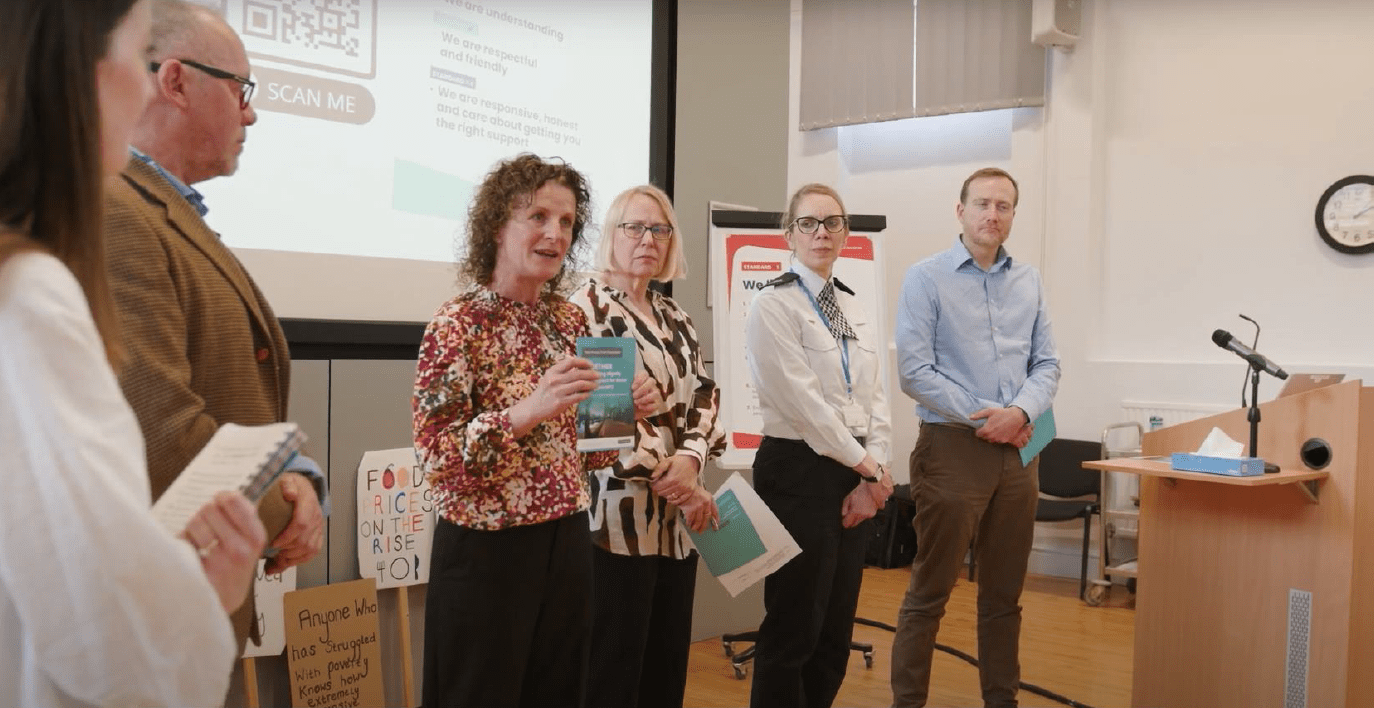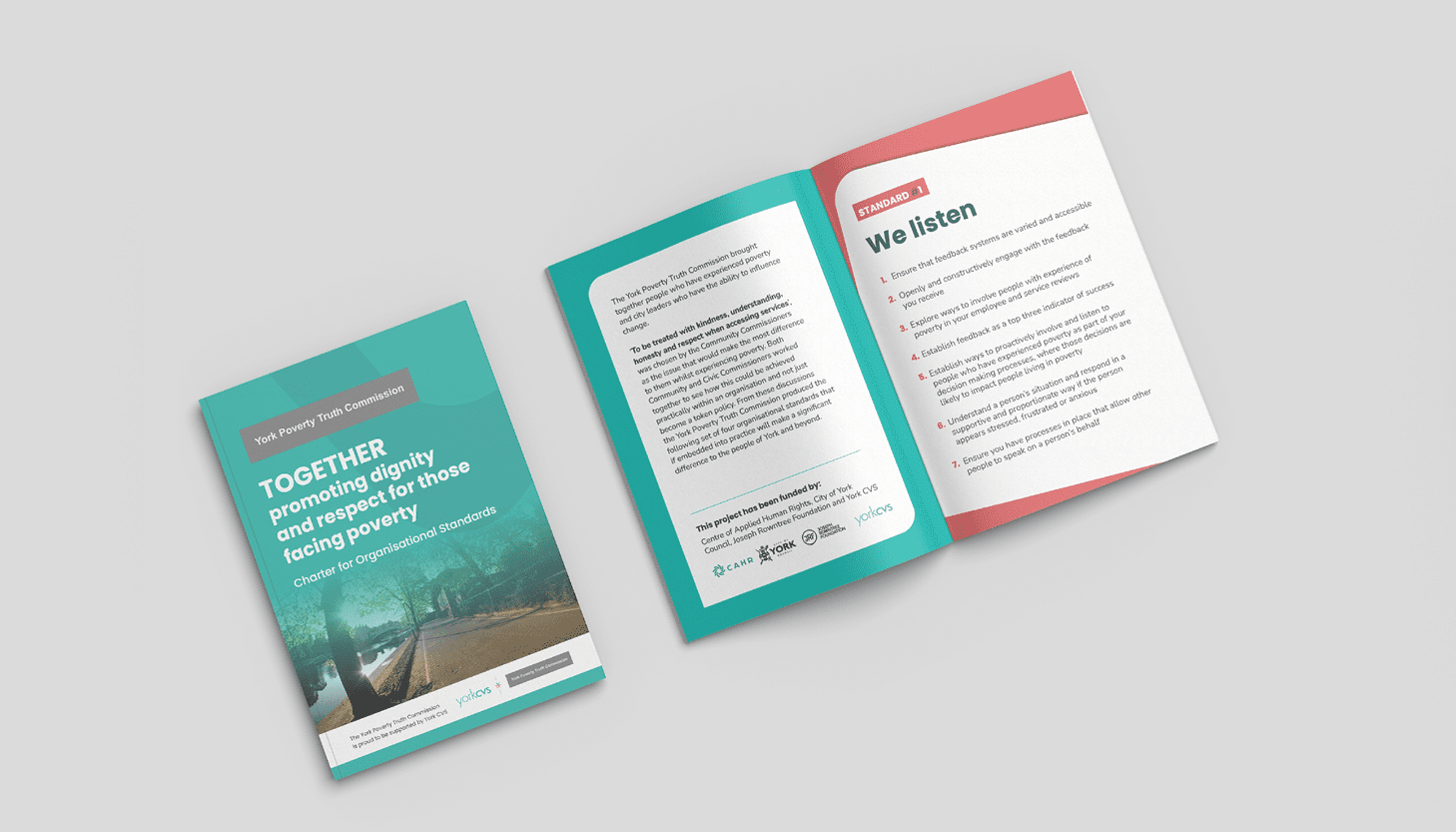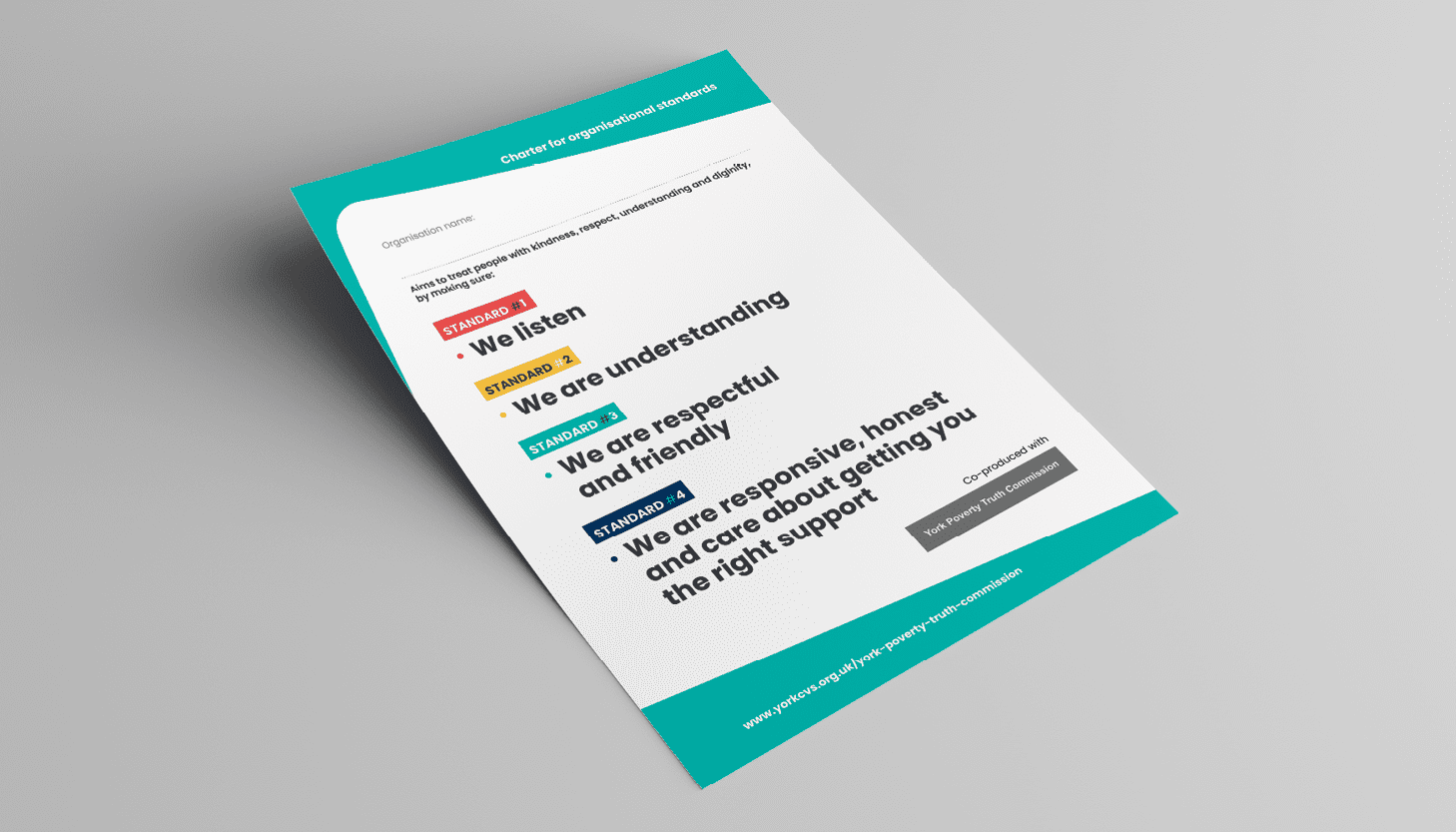
L-R: Cllr Claire Douglas, Leader of the Labour Group at City of York Council Pauline Stuchfield, Director of Customer & Communities at City of York Council Fran Naughton, Detective Superintendent of North Yorkshire Police Paul Kissack, Group Chief Executive at Joseph Rowntree Foundation
A new set of organisational standards – co-designed by Community Commissioners (individuals with lived experience of poverty) and Civic Commissioners – has been officially adopted by City of York Council, representing a meaningful move toward fairness, dignity and inclusivity in how services are designed and delivered.
This milestone is the result of a three-year project led by the York Poverty Truth Commission at York CVS, which brought together people with direct experience of poverty and decision-makers to develop a shared understanding of what truly matters to those experiencing poverty and how they would like to be treated.
‘To be treated with kindness, understanding, honesty and respect when accessing services’, was chosen by the Community Commissioners as the issue that would make the most difference to them while experiencing poverty.
From this, the Civic and Community Commissioners worked together to co-produce a Charter for Organisational Standards – a pledge for organisations to sign and implement into their practices to ensure services are shaped by the voices of those who use them. The charter outlines four key commitments:
Standard #1 - We listen
1. Ensure that feedback systems are varied and accessible
2. Openly and constructively engage with the feedback you receive
3. Explore ways to involve people with experience of poverty in your employee and service reviews
4. Establish feedback as a top three indicator of success
5. Establish ways to proactively involve and listen to people who have experienced poverty as part of your decision-making processes, where those decisions are likely to impact people living in poverty
6. Understand a person’s situation and respond in a supportive and proportionate way if the person appears stressed, frustrated or anxious
7. Ensure you have processes in place that allow other people to speak on a person’s behalf
Standard #2 - We are understanding
1. Ensure you are not making assumptions about individuals or their situation at the start of your interactions
2. Take time to really listen to a person and understand their unique situation
3. Frequently check you are correctly understanding what you are being told by asking questions (it may help to explain why you are doing this so it doesn’t appear as though you are interrogating the person or trying to trip them up)
4. At the end of your interactions, check if people felt understood and whether you have responded to their needs
5. Support everyone in your organisation to attend training or experiences that will help improve their understanding of poverty
Standard #3 - We are respectful and friendly
1. Ensure you are not making assumptions about individuals or their situation at the start of your interactions
2. Take time to really listen to a person and understand their unique situation
3. Frequently check you are correctly understanding what you are being told by asking questions (it may help to explain why you are doing this so it doesn’t appear as though you are interrogating the person or trying to trip them up)
4. At the end of your interactions, check if people felt understood and whether you have responded to their needs
5. Support everyone in your organisation to attend training or experiences that will help improve their understanding of poverty
Standard #4 - We are responsive, honest and care about getting you the right support
Although approaches should be responsive to the personal and cultural preferences of individuals, it is likely that being respectful and friendly would include:
1. Adopt an empowering and engaging approach in your interactions, with an emphasis on helping people to find solutions that are right for them and their circumstances
2. Ensure your teams have the skills and capability to make decisions and resolve the issues people need help with
3. Empower colleagues to use their discretion to give people the support they need and find solutions
4. Recruit, train and support colleagues so that they have both the right skills and the right values
5. Acknowledge when you don’t understand or have made a mistake
6. Be open about what you can and can’t do. If you can’t do something explain the reasons why and, where possible, help the person identify someone else who can help
7. Ensure you leave people with appropriate contact details at the end of your interaction
The York Poverty Truth Commission began by asking one question: What would happen if people who had experienced poverty were at the heart of decision-making? The answer has been transformational.
Alison Semmence, Chief Executive Officer at York CVS, said:
“When we started the Poverty Truth Commission we had no idea of what the outcome would be. So we are so pleased to see something tangible has come from the hard work of the Community and Civic Commissioners. The standards are a basic human right – people simply want to be treated with kindness, dignity, and respect. We encourage everyone to use these Standards in their daily lives, as kindness really does make a difference to people, especially to those who are struggling.”
John McGall of i am reusable and a York Poverty Truth Commissioner can’t thank the council enough for joining York Poverty Truth as Civic Commissioners.
“Thanks especially go to Cllr Claire Douglas and Pauline Stuchfield for taking their time out to support us in our charter.
The council’s backing for our standards will further support our vision to establish a culture and conditions that would make York a healthier, more affordable, more sustainable and more accessible place, where everyone feels valued. In addition, it will support the ongoing work Poverty Truth feel so strongly about.
The Council signing will reinforce the council’s role in removing barriers to make it easier for residents to engage with the other groups and other partners across the city and we can hold them to account moving forward.
The Community Commissioners’ work is vital in helping us to make York a fairer, more equitable city for all our residents. I want to thank all the Civic Commissioners for giving their time to developing these standards with us.
It’s only by truly understanding the experiences of people living with poverty, disabilities and homelessness in York that we can help to provide the support they need in the ways they need it most”
Cllr Katie Lomas, City of York Council’s Executive Member for Performance, Major Projects, Human Rights, Equality and Inclusion, said:
“By adopting this charter, which was co-produced by people with lived experience of poverty and by valued partners, we intend it to make a meaningful and lasting difference to our residents in the ways they need it most. Thank you to the Commissioners who gave their time to develop these standards.
“Just as we and our partners have pledged to adopt and integrate the charter into our working practices, we invite others to do the same. This also supports ongoing work to co-produce a 10-year Anti-Poverty Strategy for York.”
We invite you to pledge your organisations support…
Organisations across York are invited to sign up to the Charter for Organisational Standards and join a growing movement that puts dignity, understanding and respect at the heart of public service.



